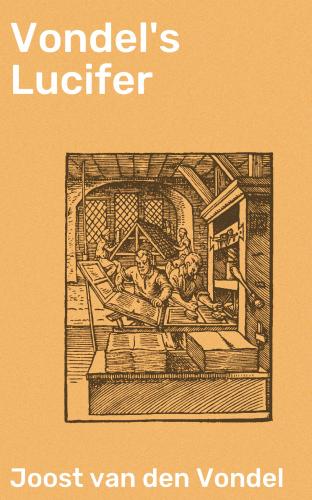Joost van den Vondel
Vondel's Lucifer
Published by Good Press, 2021
EAN 4057664636966
Table of Contents
Bibliography of Vondelian Literature.
On the Portrait of His Imperial Majesty. Ferdinand the Third.
A Word to All Fellow-Academicians and Patrons of the Drama.
Introduction.
Vondel's Lucifer in English.
It has become a matter of literary tradition, in Holland and out of it, that the choral drama of "Lucifer" is the great masterpiece of Dutch literature. The Dutch critics, however, are by no manner of means unanimous in this opinion. In point of fact, it has been assigned by some a place relatively subordinate among the works of this "Dutch Shakespeare," as they are fond of calling Vondel at home. No other one, however, in the long list of his dramas and poems, from the "Pascha" of 1612 to his last translations of 1671, the beginning and the end of a literary career, in which one of the greatest of Dutch writers on its history has pronounced the poetry of the Netherlands to have attained its zenith, will, none the less, so strongly appeal to us, outside of Holland, as does the "Lucifer." Vondel's tragedy "Gysbreght van Amstel" may have found far greater favor as a drama, and the poet may possibly in his lyrics have risen to his greatest height; but neither the one nor the other, in spite of this, can have such supreme claims upon our attention.
Why this is so is dependent upon a variety of reasons. It is not solely on account of the lofty character of the subject, nor because we have an almost identical one in a great poem in English literature, between which and the "Lucifer" there is a more than generic resemblance. The question of Milton's indebtedness to Vondel is no longer to be considered an open one, and has resolved itself into an inquiry simply as to the amount of the influence exerted. This is an interesting phase of the matter, and, since it involves one of our great classics, an important one. The two poems, nevertheless, however great this influence may be shown to be, are by no manner of means alike in detail, and one main source of interest to us, to whom "Paradise Lost" is a heritage, is undoubtedly to compare the treatment of such a subject by two great poets of different nationalities. The paramount reason, however, why the "Lucifer" should appeal to us is because it is, in reality, one of the great poems of the world; because of its inherent worth, its seriousness of purpose, the sublimity of its fundamental conceptions, its whole loftiness of tone. When the critics praise others of Vondel's works for excellences not shared by the "Lucifer," they extol him immeasurably, for there is enough in this poem alone to have made its author immortal.
It is a matter of surprise that down to the present time there has been no English translation of "Lucifer," although, after all, its neglect is but a part of the general indifference among us to the literature of Holland in all periods of its history. Why this should be so is not quite apparent; for wholly apart from the important question of action and reaction as a constituent part of the world's literature, the literature of Holland has in it, in almost every phase of its development, sublimities and beauties of its own which surely could not always remain hidden. An era of translation was sure to set in, and it is a matter of significance that its herald has even now appeared.
That the first considerable translation of any Dutch poet into English should be Vondel, and that the particular work rendered should be the "Lucifer," is, from the preëminent place of writer and poem in the literature of the Netherlands, altogether apt.
It is particularly fitting, however, that such an English translation, both because it is first and because it is Vondel, should be put forth, beyond all other places, from this old Dutch city of New York. There is surely more than a passing interest in the thought that, at the time of the appearance of Vondel's "Lucifer" in old Amsterdam, in 1654, its reading public was in part New Amsterdam, as well. Whether any copy of the book ever actually found its way over to the New Netherlands is a matter that it is hardly possible now to determine; but that it might have been read in the vernacular as readily here as at home is a fact of history. Only two years after the publication of the "Lucifer," that is in 1656, Van der Donck, as his title page states, "at the time in New Netherland," printed his "Beschryvinge van Nieuw-Nederlant," in which occurs the familiar picture of "Nieuw Amsterdam op 't Eylant Manhattans," with its fort, and flagstaff, and windmill, its long row of little Dutch houses, and its gibbet well in the foreground as an unmistakable symbol of law and order.
Strikingly enough, too, during the lifetime of Vondel we were making our own contributions to Dutch literature; modest they certainly may have been, but real none the less. Jacob Steendam, the first poet of New York, wrote here at least one of his poems, the "Klagt van Nieuw-Amsterdam," printed in Holland in 1659, and from this same period are the occasional verses of those other Dutch poets, Henricus Selyns, the first settled minister of Brooklyn, and of Nicasius de Sille, first colonial Councillor of State under Governor Stuyvesant. Steendam, after he had returned from these shores to the Fatherland, is still a New Netherlander in spirit, for he continued to sing in vigorous, if homely, verses of the land he had left, which in his long poems, "'T Lof van Nieuw-Nederland," and "Prickel-Vaersen" he paints in glowing colors:
Nieuw-Nederland, gy edelste Gewest
Daar d'Opperheer (op 't heerlijkst) heeft gevest
